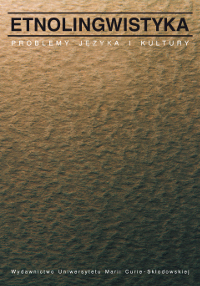Opozycja język ojczysty / język obcy w językach słowiańskich
The opposition “native/foreign language” in Slavic languages
Author(s): Lidia Nepop-AjdaczyćSubject(s): Language studies, Language and Literature Studies, Applied Linguistics, Cognitive linguistics
Published by: Wydawnictwo Naukowe Uniwersytetu Marii Curie-Sklodowskiej
Keywords: native language; foreign language; Slavic languages; homeland; foreign land; us vs. them
Summary/Abstract: The author analyzes the names of the native language and a foreign language (spoken in the speakers’ own country and abroad) in eleven Slavic languages: Ukrainian, Russian, Byelorussian, Polish, Czech, Slovak, Serbian, Croatian, Bulgarian, Macedonian and Slovene. On this basis she investigates in what way the concepts “native/our” and “foreign” are used in reference to a language and territory. Thus certain oppositions can be identified, which the author presents in the form of schemata. A final table juxtaposes them all in a holistic perspective on these oppositions in Slavic languages. A conclusion is drawn that in reference to tongues the most frequent (in Czech, Slovak, Bulgarian, Macedonian and Slovene, i.e. in five languages) is the opposition “mother” : “foreign”. But in reference to the land the most frequent is the opposition between “father” and “foreign” (in nine languages: Ukrainian, Russian, Byelorussian, Polish, Czech, Slovak, Serbian, Bulgarian and Macedonian). Two oppositions (“father” : “foreign” and “family line” : “foreign”) function in reference to both language and territory, but more frequently to the latter. The author also concludes that “our” in Slavic languages means 1) “of the father”; 2) “of the mother”; 3) “of the home”; 4) “of the family line”. “Not-ours” means 1) “foreign”; 2) “different” and 3) “not belonging to us”.
Journal: Etnolingwistyka. Problemy Języka I Kultury
- Issue Year: 20/2008
- Issue No: 20
- Page Range: 159-170
- Page Count: 12
- Language: Polish

